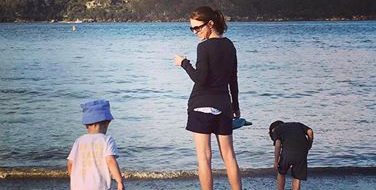 Upon receiving my trifecta of bad news this time last week, I was amazed at how quickly the flight response kicked in. That response being a flight from engaging with other people in the midst of my own sorrow; the overwhelming desire to crawl up into myself and resume life on autopilot, pretending to the world (my world, anyway) that life was carrying on normally. Having achieved no small amount of self-awareness over the last few years (hey, it only took until I was in my thirties and had my life plan ripped to shreds to get there!), I knew that my particular battle in the midst of stunning defeat would be admitting it. And so I quickly jumped ahead to the uncomfortable part, which I have learned will arrive whether I consent to it or not. So I talked. I told my office manager about the diagnosis, crying over her bucket of Jolly Ranchers. I messaged my Writing Support Team about the rather specific rejection I had received. And then, of course, I went to my blog with it all. Privacy is for wimps.
Upon receiving my trifecta of bad news this time last week, I was amazed at how quickly the flight response kicked in. That response being a flight from engaging with other people in the midst of my own sorrow; the overwhelming desire to crawl up into myself and resume life on autopilot, pretending to the world (my world, anyway) that life was carrying on normally. Having achieved no small amount of self-awareness over the last few years (hey, it only took until I was in my thirties and had my life plan ripped to shreds to get there!), I knew that my particular battle in the midst of stunning defeat would be admitting it. And so I quickly jumped ahead to the uncomfortable part, which I have learned will arrive whether I consent to it or not. So I talked. I told my office manager about the diagnosis, crying over her bucket of Jolly Ranchers. I messaged my Writing Support Team about the rather specific rejection I had received. And then, of course, I went to my blog with it all. Privacy is for wimps.
It’s not, actually, and I know this (sideways look at the Kardashians). But I also know the introversion to which I am inclined, and how it can be a heavy security blanket to carry around town. And then there’s the conflicting dual inclination we all have as humans: on the one hand, to be connected and supported by our fellow man; but on the other–more insidious and damaging–to hide what we perceive to be our weaknesses and failures from them. To keep up appearances. Which wouldn’t be too hard right now, considering I’m coasting on the fumes of an exceptionally good year. But what do we deny ourselves when we refuse to acknowledge that we could use some hands along the way?
The Husband and I saw Catfish this weekend, a.k.a. The Wrong Facebook Movie. Per its tagline and preview, we expected a suspenseful ride. Spoiler alert: we did not get it. What we did get was one story of how the internet has become a cure for loneliness for some people, how its potential for ceaseless connections can be a source of hope, life, (false) identity. NPR’s reviewer notes that the “potential for revelatory encounters” online lends itself to a documentary experience that leaves the participants and audience feeling more alive. Personally, I just felt ten bucks poorer. But I get what he’s saying. We crave company and knowing we’re not alone, but only according to the Privacy Settings with which we’re comfortable. I wonder how many “revelatory encounters” are avoided when we only tell the part of the story that makes us look good. What are we so afraid of people seeing? That we’re not the perfect mother because we don’t particularly want to watch another damn episode of Yo Gabba Gabba? That we’re not going to be the one author who skipped the rejection part? That we’re not imbued with a superhuman immunity to frailty? I’ve learned that allowing the yuck parts of myself to show can lead to a red face momentarily, but it always ends in much more depth and laughter and company than an afternoon spent watching Saved by the Bell reruns in the fetal position (not that I’ve done that…). Authentic community means comparing battle scars just as much (if not more than) recounting victories. C.S. Lewis wrote, “Friendship is born at that moment when one person says to another: ‘What! You too? I thought I was the only one.'” And we don’t get there waiting for the other person to go first. So you go.

One comment on “Keeping Company”
I despise Yo Gabba Gabba! Great post, Steph.